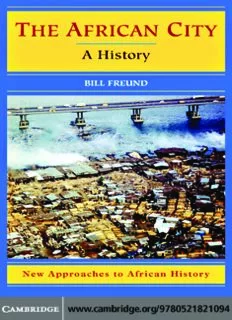
The African City: A History (New Approaches to African History) PDF
Preview The African City: A History (New Approaches to African History)
P1:JZZ 0521821096pre CUFX035/Freund 0521821096 printer:cupusbw October18,2006 12:15 This page intentionally left blank vi P1:JZZ 0521821096pre CUFX035/Freund 0521821096 printer:cupusbw October18,2006 12:15 The African City Thisuniquebooktriesinashortformattogivethereaderacomprehensive pictureofcitiesinAfricafromearlyoriginstothepresent.Itiscomprehen- sivebothintermsoftimecoverage,frombeforethePharaohstothepresent moment,andinthatittriestoconsidercitiesfromtheentirecontinent,not justsub-SaharanAfrica.Apartfromfactualinformationandrichdescription materialculledfrommanysources,itlooksatmanyissues,fromwhyurban lifeemergedinthefirstplacetohowpresent-dayAfricancitiescopeindiffi- cult times. Instead of seeing towns and cities as somehow extraneous to the real Africa, it views them as an inherent part of developing Africa – indige- nous, colonial, and post-colonial – and emphasizes the extent to which the futureofAfricansocietyandAfricanculturewilllikelybeplayedoutmostly in cities. Different positions and debates amongst scholars on African cities receive considerable attention. The book is written to appeal to students of history but equally to geographers, planners, sociologists, and development specialistsinterestedinurbanproblems. BillFreundisProfessorofEconomicHistoryandDevelopmentStudiesatthe UniversityofKwaZulu-Natal.Heistheauthorofmanybooks,includingThe AfricanWorker(CambridgeUniversityPress,1995). i P1:JZZ 0521821096pre CUFX035/Freund 0521821096 printer:cupusbw October18,2006 12:15 New Approaches to African History SeriesEditor MartinKlein,UniversityofToronto New Approaches to African History is designed to introduce students to cur- rent findings and new ideas in African history. Although each book treats a particular case and is able to stand alone, the format allows the studies to beusedasmodulesingeneralcoursesonAfricanhistoryandworldhistory. Thecasesrepresentawiderangeoftopics.Eachvolumesummarizesthestate of knowledge on a particular subject for a student who is new to the field. However,theaimisnotmerelytopresentviewsoftheliterature,itisalsoto introducedebatesonhistoriographicalorsubstantiveissues.Assuch,apar- ticularvolumemayargueforaparticularpointofview.Theaimoftheseries istostimulatedebate,tochallengestudentsandgeneralreaders.Theseriesis notcommittedtoanyparticularschoolofthought. Otherbooksintheseries: AfricaSince1940,byFrederickCooper MuslimSocietiesinAfricanHistory,byDavidRobinson ReversingSail:AHistoryoftheAfricanDiaspora,byMichaelGomez ii P1:JZZ 0521821096pre CUFX035/Freund 0521821096 printer:cupusbw October18,2006 12:15 The African City A History Bill Freund UniversityofKwaZulu-Natal iii CAMBRIDGEUNIVERSITYPRESS Cambridge, New York, Melbourne, Madrid, Cape Town, Singapore, São Paulo Cambridge University Press The Edinburgh Building, Cambridge CB28RU, UK Published in the United States of America by Cambridge University Press, New York www.cambridge.org Information on this title: www.cambridge.org/9780521821094 © Bill Freund 2007 This publication is in copyright. Subject to statutory exception and to the provision of relevant collective licensing agreements, no reproduction of any part may take place without the written permission of Cambridge University Press. First published in print format 2006 ISBN-13 978-0-511-33523-5 eBook (NetLibrary) ISBN-10 0-511-33523-7 eBook (NetLibrary) ISBN-13 978-0-521-82109-4 hardback ISBN-10 0-521-82109-6 hardback ISBN-13 978-0-521-52792-7 paperback ISBN-10 0-521-52792-9 paperback Cambridge University Press has no responsibility for the persistence or accuracy of urls for external or third-party internet websites referred to in this publication, and does not guarantee that any content on such websites is, or will remain, accurate or appropriate. P1:JZZ 0521821096pre CUFX035/Freund 0521821096 printer:cupusbw October18,2006 12:15 Contents PREFACE pagevii 1 UrbanLifeEmergesinAfrica 1 2 AfricanCitiesandtheEmergenceofaWorldTradingEconomy 37 3 ColonialismandUrbanisation 65 4 CitiesinRevolt:TheLong-TermCrisisofSouthAfrican Urbanism 107 5 ThePost-ColonialAfricanCity 142 6 GlobalisationandtheAfricanCity:Touba,Abidjan,Durban 170 INDEX 199 v P1:JZZ 0521821096pre CUFX035/Freund 0521821096 printer:cupusbw October18,2006 12:15 vi P1:JZZ 0521821096pre CUFX035/Freund 0521821096 printer:cupusbw October18,2006 12:15 Preface Urbanisation is one of the most important social processes observed andwrittenaboutovertime.Fromavarietyofbeginnings,citieshave evolvedintositeswheremoreandmorecomplexactivitiestakeplace. Atacertainpointhistorically,thecitymaylookparasiticontheproduc- tivecountryside,wherethebalancebetweenhumanbeingsandnature is so much better sustained. However, further along the line the city itselfbecomesthelogicalhomeformultitudesofsocialandeconomic activities that are fundamental to the material life of mankind. And withthat,thebalancebetweencityandcountrysidechanges. Cities attract friends and enemies. The city on the hill is a symbol of wisdom and balance, of the good life, and of democratic politics. Themetropolis–Smoketown,Shackland–isthesiteofalienationand oppression where modernity becomes a prison for men and women. On the whole, this book will try to avoid these kinds of moral judge- ments,notthattheymaynotlackvaliditywithinparticulardiscourses andforparticularindividualsortypesofindividuals.Giventheauthor’s special interests, much attention will be paid to economic and social processes and where the city fits into them. The city evolves distinc- tive cultural forms, some of them largely appropriate only to urban life, and I shall try to do some justice to these cultural forms. It also becomesinneedofadistinctivepoliticsthatfitsthedenseinterstices ofurbanliving.Thesewilltakeamoreimportantformasournarrative proceedsandurbanpoliticsacquiresthisdistinctiveness. This work is a synthesis not only of monographic work but of syntheses. There have been not only numerous excellent studies of vii P1:JZZ 0521821096pre CUFX035/Freund 0521821096 printer:cupusbw October18,2006 12:15 viii PREFACE urban life and urban history situated in Africa, but even some excel- lent general works on some aspects of urban society. The ambition here is to create a larger picture of African cities developed histor- ically from the proverbial beginning. This is, I believe, a path that has not been trodden. Why do it? One reason for this is that while particular towns and cities that fit particular historical purposes and political or economic ends may come and go, the urban tradition is oneofaccretionandagglomeration,notoneofentirelydistinctstages. Cities inevitably carry baggage from their individual and collective pasts that have to be understood. Another reason is to confront the ruralbiasthataffectsmuchAfricanstudies,particularlyintheEnglish languagescholarlytradition.MahmoodMamdanihasprovidedforus a framework for colonial politics in Africa that divides rule between thepotentiallydemocraticworldofthecitizenandtheautocraticworld of the subject – and native authority (Citizen and Subject, Princeton: PrincetonUniversityPress,1996).Onthewhole,thecitywasthemore likelyresidenceofthecitizenandtheconceptofindividualcitizenship, sostandardinthecolonialmetropoles,potentiallythreatenedtheform of colonial rule in Africa. Rural studies, peasant studies, have easily representedthemselvesasthetrueAfrica.Bycontrast,thisbookinsists not only that the urban has a historic place in Africa of some impor- tance – even if it is not necessarily the home of citizen democracy – but that this importance has grown and grown and that the future of Africaislikelytobeincreasinglyurban.Africanstudieshavetosituate themselves in part on an urban foundation. In the last two chapters, Idrawadistinctionbetweenmodernistinterpretationsofthecityand postmodern approaches. I will have to admit to my prejudices being verylargelymodernistmyself,butIcanseethestrengthofsomepost- modern insights and try to bring those to bear on the discussion in thosechapters. AfricaisalsoagoodplacetostudycitiesbecauseAfricancitiesare so varied. We can find one-industry towns as well as diverse urban economies,fragileandnascenturbandevelopmenttraceablefromthe historicalrecordandtheworkofarchaeologistsaswellassomeofthe Third World metropolises that rightly exercise the minds of develop- mentexperts.Niceasitmightbetobeanexpertoneverywhere,this scholar has his special interests and areas in which he has a strong background. In recent years, I have written quite a lot on the politi- cal economy of Durban, the South African city in which I live. This has extended itself as well into participation in a comparative project
